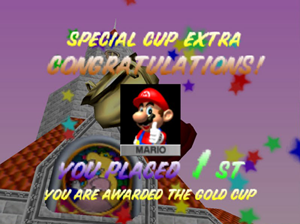One of the things I learned early on during my game developer career is that it’s always important to reward your player. I’m not just talking about things you’d expect, such as unlockable content, finding new items that help you progress further in the game, and so on. There are also subtle, little things that are important which you can take for granted.
When I was performing QA at one company, we received a list of feedback from Nintendo Japan’s Super Mario Club for a racing game I was working on. This was really exciting and useful for me, as it gave me insight as to what can help the player enjoy the game more. For example: adding confetti to the race results screen, and making the trophy you received look bigger. These changes weren’t hard to make, and meant that the player felt like they’d accomplished something on each race. Giving your player a positive feeling is always important – it seems that sometimes developers can forget that games are meant to be fun!
If you’ve played Super Mario World, you’ll always remember the game’s level completion. Let’s dissect it. In approximately 10 seconds, you get:
In ten seconds, Nintendo has managed to make you feel like the most amazing person ever for crossing the finish line. And this happens every time you complete a level! Why wouldn’t you want to keep playing when it comes to positive reinforcement like that?





I feel like it’s also important not to over-reward your player or they’ll feel like they’re being patronised.
The point at which you get these rewards in Super Mario World is also the point at which you can finally stop repeating this level over and over, and that’s already a moment of great relief and success. The fanfare amplified this already rewarding moment.
If you had a game where it goes nuts congratulating you for every little thing, saying what a great job you did picking up that bowl or pressing X when it told you to, you would just feel like the game was laying it on a bit thick.
U pushin’ COOL!
Yeah, I’ve noticed a lot of casual games tend to overdo it, giving you a massive fanfare and particle effects for doing an action like clicking the “OK” button. Encouragement is precious – but do it too much and it just becomes expected, rather than encouragement.
I think a reward can be used satirically as well to good effect. Look at Peggle. I cracked up when I saw the crazy fanfare you got after dropping a ball down some pegs. That was meant to be satirical right?
Rock Band 3 is one of my favourite examples of perpetual reward. By:
(a) including literally hundreds of achievement-style career goals (many earned by accident, by trying new things, or as a natural consequence of long term play), and
(b) making the acquisition of these goals the fundamental purpose of the game
…even a quick practice round or party playthrough feels like it’s working toward an end.
Being a sound-oriented person, I always admire end of level sequences that leverage silence for dramatic effect. That split second between the level music trailing off and a triumphant victory tune can work wonders. In that moment, you hold your breath, making the eventual sigh of relief all the more sweet.